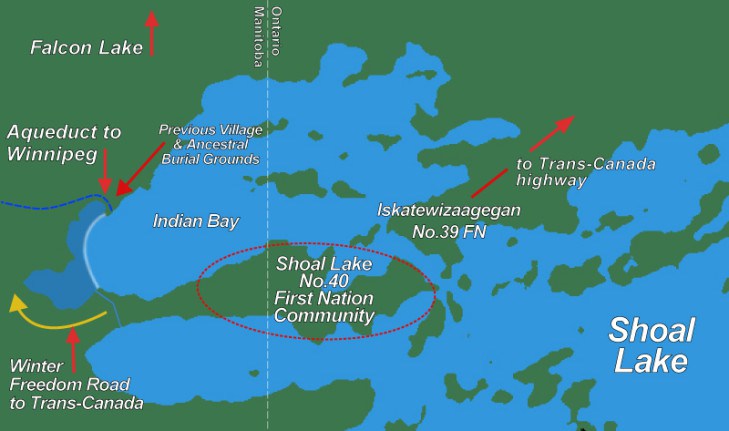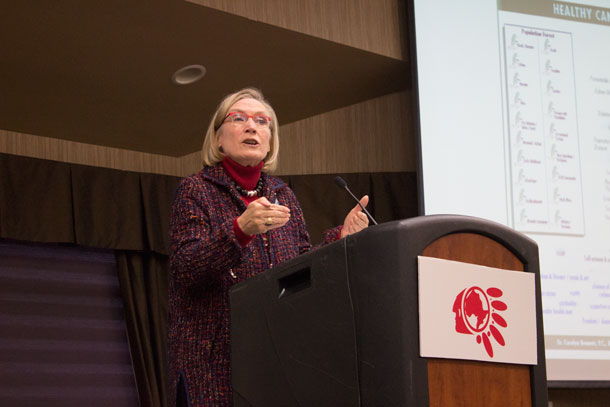 THUNDER BAY – OPINION – The small First Nations community of Shoal Lake #40 is located in a lake of the same name just east of the Ontario-Manitoba border and south of the Trans-Canada highway in the Kenora district of northwestern Ontario. In the early part of the 20th century, the city of Winnipeg petitioned the federal and provincial governments for permission to build an aqueduct from the lake to the city – a distance of over 150 kilometres, in order to supply thirsty Winnipeg businesses and residents with an “endless” supply of water. Shoal Lake residents were then relocated away from their traditional village on the side of the lake to a nearby peninsula. To ensure that weeds, murky water and other undesirable substances did not enter the aqueduct intake system, the engineers of the day constructed both a dyke and a canal in the area essentially turning the newly relocated community into an isolated island cutting it off from the mainland and a terrestrial route for travel and supplies.
THUNDER BAY – OPINION – The small First Nations community of Shoal Lake #40 is located in a lake of the same name just east of the Ontario-Manitoba border and south of the Trans-Canada highway in the Kenora district of northwestern Ontario. In the early part of the 20th century, the city of Winnipeg petitioned the federal and provincial governments for permission to build an aqueduct from the lake to the city – a distance of over 150 kilometres, in order to supply thirsty Winnipeg businesses and residents with an “endless” supply of water. Shoal Lake residents were then relocated away from their traditional village on the side of the lake to a nearby peninsula. To ensure that weeds, murky water and other undesirable substances did not enter the aqueduct intake system, the engineers of the day constructed both a dyke and a canal in the area essentially turning the newly relocated community into an isolated island cutting it off from the mainland and a terrestrial route for travel and supplies.
It is more than ironic that the very same water source which has fueled the factories, slackened the thirst and washed the laundry of Winnipeg residents for generations has also served to imprison Shoal Lake residents on land now surrounded by that same water source!
All that relocating, dyke, canal and aqueduct work on the lake has ultimately resulted in another tragic irony in the sad history of government/First Nations relations. The Shoal Lake First Nation has suffered under a boil-water advisory for nearly two decades. Their island isolation has been breached by an off-again, on-again ferry in the summer months. But the spring and fall have been treacherous for the community as many have perished falling through the ice. The reserve did build a bridge to ford the canal but that is of use only in the winter months when a winter road connects them to the outside world. This is an increasingly tenuous connection at best considering our ever-warming climate. Building a water treatment plant in the community without an all-weather road providing access is very problematic and the requirement to maintain water quality on the lake for Winnipeg residents has severely inhibited whatever economic developments might benefit the community.
The anticipated dust has not even begun to collect and settle on Justice Murray Sinclair’s preliminary report and recommendations of the Truth and Reconciliation Commission before we are once again exposed to a travesty perpetrated on the Aboriginal people of Shoal Lake by Stephan Harper’s federal government. There is little wonder why, yet again, Canada has been brought before the United Nations Human Rights Commission and asked to account for its miserable treatment of Canada’s first peoples. Access to clean, potable water is a basic human right.
At the very least, the Manitoba and Winnipeg governments have made a commitment to begin to right this egregious wrong with funds for the construction of a road.
What of the Harper government in all of this?
In addition to its overwhelming failure to execute its fiduciary responsibility to the beleaguered First Nation residents of Shoal Lake, we are treated to the spectacle of one of his ministers whose federal riding includes the residents of Shoal Lake, yet again blowing off the possibility of constructing an all- weather road to the community. In a recent meeting with the community he committed his government to studying the issue: beaucoup de blah- blah signifying nothing. And the Wynne government announces that it is spending $78 million on highways in northwestern Ontario and not a cent on a Shoal Lake road? Reconciliation indeed!
Kenora MP and minister of “Natural Resources” Greg Rickford needs to call upon Conservative cabinet-mate Tony Clement and borrow a few pages from his playbook. That honourable minister was able to misspend $50 million on parks and gazebos in his riding without so much as a sign-off or paper trail. In this case, in building that desperately needed road for these long-suffering Canadians, at least Rickford would be doing it for the right reasons! But then again, it is like the garbage he takes out to the end of his driveway – within a day, poof – its gone! – out of sight, out of mind.
Beverly Sabourin is a member of the Pic Mobert First Nation and the recently retired Vice-Provost of Aboriginal Initiatives at Lakehead University. Peter Globensky is a former senior policy advisor on Aboriginal Affairs in the Office of the Prime Minister and recently retired as CEO of the Canadian Council of Ministers of the Environment. They invite your comments at basa1@shaw.ca


